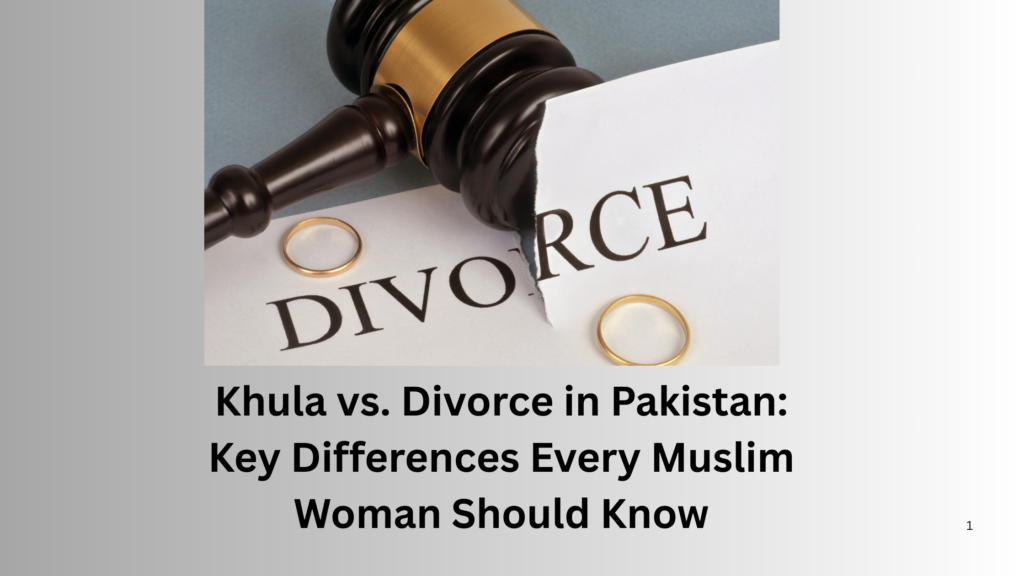
Many Muslim women in Pakistan face confusion between Khula and Divorce (Talaq) when considering ending their marriage. While both lead to separation, they follow different legal processes under Islamic law and Pakistani family law. Understanding these differences is crucial for protecting your rights.
This guide explains the distinctions between Khula and Divorce in Pakistan, helping women make informed decisions.
What is Khula in Islam?
Khula is a type of divorce initiated by the wife, allowing her to end the marriage without proving her husband’s fault. Under Pakistani family law, Khula has specific features:
- The wife must explicitly request Khula—courts cannot grant it without her consent.
- She typically gives up her dower (Mahr) or offers financial compensation in exchange for release from the marriage.
- No proof of abuse or wrongdoing is required—she only needs to express her unwillingness to continue the marriage.
- Once granted, Khula results in an irrevocable divorce (Talaq-e-Bain).
- The wife must observe Iddat, a mandatory waiting period after divorce.
Important Note: Khula is a Quranic right, meaning Pakistani courts cannot force it on a woman. If she seeks a judicial divorce instead, the court must respect her choice.
What is Judicial Divorce in Pakistan?
Under the Dissolution of Muslim Marriages Act, 1939, a woman can seek divorce (Faskh) based on valid legal grounds, including:
- Physical or mental cruelty
- Husband’s failure to provide maintenance
- Desertion (absence for four or more years)
- Impotency
- Husband’s second marriage without consent
Key Differences from Khula:
- The wife retains her Mahr unless she agrees otherwise.
- She must provide evidence (such as witness statements or medical reports) to support her case.
- The process is longer because courts examine the evidence before granting a divorce.
Khula vs. Divorce: Major Legal Differences
The main differences between Khula and judicial divorce in Pakistan are:
- Who Initiates It?
- Khula is initiated by the wife.
- Judicial divorce is also filed by the wife but requires valid legal reasons.
- Financial Rights
- In Khula, the wife usually gives up her Mahr.
- In judicial divorce, she keeps her Mahr unless she voluntarily returns it.
- Proof Required
- Khula does not require evidence—only the wife’s request.
- Judicial divorce demands proof of misconduct or valid grounds.
- Processing Time
- Khula is faster since no evidence is needed.
- Judicial divorce takes longer due to court hearings and legal scrutiny.
- Finality of Divorce
- Khula results in an irrevocable divorce (Talaq-e-Bain).
- Judicial divorce may sometimes be revocable, depending on the circumstances.
Supreme Court Ruling: Pakistani courts cannot convert a divorce petition into Khula without the wife’s consent. Mislabeling the case could deprive her of financial rights, so women must clearly state their desired process.
Frequently Asked Questions (FAQs)
1. Can a woman get Khula without her husband’s consent?
Yes. Pakistani courts can grant Khula even if the husband refuses, as long as the wife clearly requests it and is willing to return the dower.
2. Does Khula require Halala for remarriage?
No. Khula is a single irrevocable divorce, meaning the couple can remarry later without Halala unless other conditions apply.
3. What if a court wrongly labels a divorce case as Khula?
The Supreme Court of Pakistan has ruled that judges must respect the wife’s choice. If a woman files for judicial divorce, the court cannot force Khula on her. Mislabeling the case may unlawfully deny her financial rights.
4. Which is faster—Khula or Divorce?
Khula is quicker because it does not require evidence. Judicial divorce takes longer due to legal procedures and evidence submission.
5. Can a woman keep her Mahr in Khula?
Usually, no. In Khula, the wife typically forfeits her Mahr unless she negotiates otherwise. In judicial divorce, she retains her Mahr unless she agrees to return it.
Conclusion: Protect Your Rights
- Khula is a fault-free, wife-initiated divorce but may require sacrificing the Mahr.
- Judicial divorce protects financial rights but requires valid legal grounds and evidence.
- Courts cannot force Khula—always specify whether you seek Khula or judicial divorce.
Final Advice: If you are considering divorce in Pakistan, consult a family lawyer to ensure your rights are fully protected.
